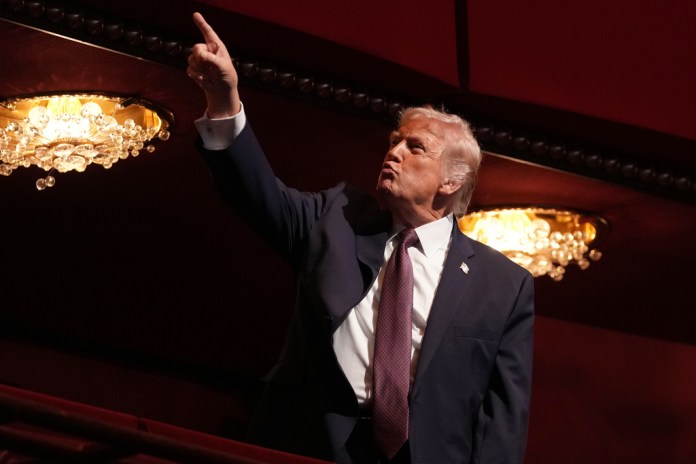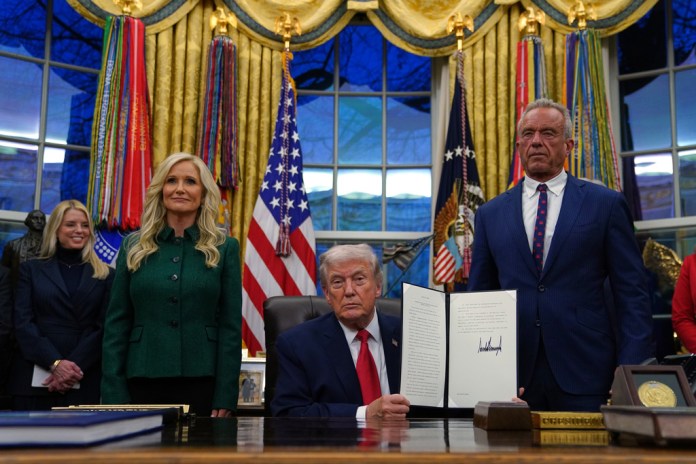Trump Shows Extreme Restraint On Imperial Judiciary
The text discusses a recent Supreme Court ruling in the case of “Trump v. CASA,inc.,” where the Court rebuked lower court judges for issuing nationwide injunctions against Donald Trump’s policies, notably concerning immigration and citizenship. Chief Justice John Roberts is criticized for allowing lower courts to overstep their authority, which has led to a pattern of “imperial judiciary” behavior, undermining the executive branch. The author cites specific instances where district court judges issued controversial injunctions, including forcing the Trump Administration to allocate funds against its will.
The commentary highlights a concerning judicial trend: lower courts are becoming increasingly bold, ignoring Supreme Court directives, and almost habitually issuing injunctions without jurisdiction. This has resulted in significant challenges for the Trump Administration, which is often forced to comply with these orders, even when unlawful.Notably,the district court in Maryland issued a standing order that automatically grants injunctions against the Administration without proper jurisdiction.
The author argues that this unchecked judicial activism damages the reputation of the judiciary itself and raises questions about the limits of judicial power versus executive authority. Furthermore, the text expresses concerns over the long-term implications of judges ignoring rule of law, suggesting it fosters public contempt for the judiciary. Ultimately, the piece calls into question the consequences for judges who operate without accountability and suggests that the ongoing issue reflects poorly on the courts and affects the broader judicial landscape in the United States.
Margot Cleveland,an investigative journalist and legal analyst,authored the piece,underscoring her extensive background in law and journalism.
“‘[E]veryone, from the President on down, is bound by law.’ That goes for judges too,” the Supreme Court declared last week in holding several lower court judges erred in entering nationwide injunctions in the lawsuits challenging Donald Trump’s birthright citizenship executive order. The Supreme Court’s Friday decision in Trump v. CASA, Inc. represents the high court’s most recent check on what it branded an “imperial judiciary.” Yet, there appears no end in sight to the lower courts’ entry of lawless injunctions against the Trump Administration.
The Supreme Court — or more specifically, Chief Justice John Roberts — holds much blame for enabling this coup by court. Early on during the second Trump Administration, when single district court judges began crowning themselves Kings (or Queens) of the Constitution, rather than forcefully halt the lawlessness of the lower courts, Justice Roberts led the high court in providing gentle corrections.
Consider, for instance, the injunction entered Department of State v. AIDS Vaccine Advocacy Coalition. In that case, several American businesses and nonprofits which received grants from the State Department and USAID sued the Trump Administration, claiming the temporary pause of funding was unlawful. A district court judge entered an injunction ordering the Trump Administration to halt its pause. Then, when payments didn’t restart fast enough for the judge’s liking, he ordered the government to pay out approximately $2 billion in taxpayer funds within 36 hours.
The Trump Administration sought a stay from the Supreme Court, arguing the lower court lacked jurisdiction to order the government to pay grants. Chief Justice Roberts entered an administrative stay, but then after the 36-hour deadline to pay the grants expired, rather than make clear there was no jurisdiction, the Court noted that since the deadline had passed, there was no need to address the challenged order. The Supreme Court, however, also told the lower court “to clarify what obligations the Government must fulfill to ensure compliance with the temporary restraining order, with due regard for the feasibility of any compliance timelines” — an implicit rebuke of its earlier injunction.
Justice Samuel Alito, joined by three other justices, dissented from this punt, writing:
“Does a single district-court judge who likely lacks jurisdiction have the unchecked power to compel the Government of the United States to pay out (and probably lose forever) 2 billion taxpayer dollars? The answer to that question should be an emphatic ‘No,’ but a majority of this Court apparently thinks otherwise. I am stunned.”
Elections have consequences and so do judicial opinions. And the Supreme Court’s refusal to clamp down on the district court’s lawless order has emboldened the judicial activist judges hand-picked by plaintiffs’ attorneys seeking to thwart the president’s American First agenda.
Afterall, imperial judges face no practical consequences. Given the closely divided Congress, they won’t be impeached. And reversal comes at no cost to the judges: It isn’t like they can be held in contempt. Shaming won’t work either, as the judges recognize ideology, and not intellectual prowess, is driving their decision, so they don’t view being overturned as a blemish on their judicial record — especially given the accolades they receive from anti-Trump politicians, pundits, and the public.
This consequence-free environment, coupled with the Supreme Court’s dithering, explains why the lower courts not only continue to issue lawless orders but, in some cases, ignore the holdings issued by the appellate courts, including the Supreme Court.
On the lawless order front, a clear example exists in the May 21, 2025 standing order issued by the United States District Court for the District of Maryland, which directs the clerk to automatically enter an injunction against the Trump Administration, barring the removal or change of legal status of any alien detained in Maryland who had filed a habeas petition. That standing order grants an automatic injunction, even in cases where the district court lacks jurisdiction or the claims are frivolous.
In fact, so blatantly lawless is the district court’s standing order that last week the Trump Administration sued all 15 federal judges in District of Maryland, arguing the judges’ issuance of the standing order represents a violation of federal law governing injunctions and the limits Congress placed on the lower court’s jurisdiction in immigration cases. The Trump Administration’s unorthodox lawsuit highlights how hamstrung the president is when faced with a judiciary gone wild.
That lawsuit also represents the president’s efforts to go on offense, with the Trump Administration, to date, forced instead to defend over 100 lawsuits. And notwithstanding the clear illegality of many of the lower court orders, the president has remained committed to obey the lawless orders, until he succeeds in obtaining a stay from the circuit court of appeals or the Supreme Court.
However, several low court judges have proven themselves incorrigible, ignoring appellate court decisions and continuing to enjoin the Trump Administration even after the president has prevailed on appeal. For instance, a federal district court judge in Maryland ordered the reinstatement of three Commissioners of the Consumer Product Safety Commission (CPSC), whom President Trump had fired. The Maryland federal judge ordered their reinstatement even though the Supreme Court recently stayed similar orders reinstating the Members of the Merits Systems Protections Board (MSPB) and the National Labor Relations Board (NLRB), whom the president had fired.
The Trump Administration is now seeking a stay of the CPSC Commissioners’ reinstatement, but in the meantime, the commissioners the President fired are wreaking havoc on the CPSC by terminating newly hired employees and reversing the decisions the Trump-appointed replacements had instituted.
Last week also saw another federal district court judge enter an order at odds with a Supreme Court decision only hours old. In DHS v. D.V.D., the Supreme Court stayed the lower court’s injunction that barred the DHS from removing aliens to third countries, absent compliance with detailed procedures. Within hours of the Supreme Court staying that injunction, the district court entered an order declaring the Supreme Court’s decision had no bearing on the court’s separate order enforcing that injunction.
Rather than ignore the lower court’s lawless order, the Trump Administration asked the Supreme Court to clarify its decision to make clear that because it had stayed the lower court’s injunction, the judge could not enforce that stayed injunction. It’s been nearly a week and the Supreme Court has yet to rule on the president’s motion, leaving the Trump Administration unable to remove the illegal aliens covered by the district court’s order to third countries without risking contempt.
While the president has gone to great lengths to obey even the most outrageous lower court decisions, several district courts have nonetheless found the Trump Administration has violated various orders. For instance, Judge James Boasberg found probable cause existed that the Trump Administration committed criminal contempt of court in the immigration case of J.G.G. v. Trump. In other cases, the judges, rather than proceed to contempt, have instead entered additional orders to enforce the previously entered injunctions. For instance, in Pacito v. Trump, a federal judge in Washington state entered an order on a motion to enforce, directing the Trump Administration to process over one hundred immigrants.
The judiciary’s micro-management of the executive branch seems sure to continue, but one must wonder what would happen if Trump decided he’s done following the lawless orders of the district courts — making the executive branch the check on the imperial judiciary. How could the courts practically hold the Trump Administration in contempt?
Fines and imprisonment represent the typical consequences for contempt, but who would be fined or arrested? Judge Boasberg seemed to think he could figure out someone responsible by questioning the Trump administration officials to learn who gave the particular directives that the federal judge concluded violated his order not to remove aliens to El Salvador. Yet communications between attorneys and their clients, as well as between the President and his advisors, are privileged.
The judges know as much and surely see no practical way to enforce their orders or to hold the Trump Administration in contempt. But they likewise also know that the spectacle of finding the Trump Administration in contempt will damage the president.
However, what the judges have yet to appreciate is that their own lawlessness is destroying the reputation of the courts. And that Americans are beginning to hold the judges in contempt, is a far worse consequence — both for the courts and our country.
Margot Cleveland is an investigative journalist and legal analyst and serves as The Federalist’s senior legal correspondent. Margot’s work has been published at The Wall Street Journal, The American Spectator, the New Criterion, National Review Online, Townhall.com, the Daily Signal, USA Today, and the Detroit Free Press. She is also a regular guest on nationally syndicated radio programs and on Fox News, Fox Business, and Newsmax. Cleveland is a lawyer and a graduate of the Notre Dame Law School, where she earned the Hoynes Prize—the law school’s highest honor. She later served for nearly 25 years as a permanent law clerk for a federal appellate judge on the Seventh Circuit Court of Appeals. Cleveland is a former full-time university faculty member and now teaches as an adjunct from time to time. Cleveland is also of counsel for the New Civil Liberties Alliance. Cleveland is on Twitter at @ProfMJCleveland where you can read more about her greatest accomplishments—her dear husband and dear son. The views expressed here are those of Cleveland in her private capacity.
" Conservative News Daily does not always share or support the views and opinions expressed here; they are just those of the writer."



